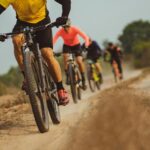As an executive coach and writer, Brad Stulberg studies the science of performance. His books probe the connections between passion, motivation and success.
He co-created The Growth Equation, which he describes as “dedicated to the art and science of a more fulfilling and sustainable kind of success.” He summarizes the equation as stress plus rest equals growth, and that applies to running a business just as much as it does to getting in shape.
In this Q&A, Stulberg offers these tips for making exercise a foundational part of your life.
1. Treat exercise as a foundational habit.
Crossman: You tweeted this: “Whatever your ‘job’ may be—whether an athlete, writer, executive, founder, parent, or musician—think of exercise as a part of it. Too many people neglect exercise because they see it as something separate from their main work. This is a trap. Exercise is a foundational habit.”
What benefits would someone who works in the gig economy get from exercise as a foundational habit?
Stulberg: For starters, when I refer to exercise I am really talking about physical activity. Yes, this can mean lifting weights in a gym or running, but it can also mean going for a fast-paced walk, dancing or gardening. What we’re talking about is doing something that gets your heart rate up and connects your mind and body. The benefits are wide ranging. They include better emotional control, better sleep, decreased cortisol (the stress hormone), enhanced focus, improved problem-solving, and breakthrough creativity. All of this is in addition to the myriad benefits a regular movement practice has for physical health, benefits which have been written about extensively for years.
2. Connect physical activity with a higher purpose.
Crossman: You wrote about how having a sense of higher purpose can elevate us even when we are doing something mundane. The example you use is a study of janitors who clean hospital bed pans. Exercise can often be mundane. How can we find in it a higher purpose?
Stulberg: Physical activity teaches you a lot about yourself. What do you do when the going gets tough? Can you put your body on the line? Can you be vulnerable, and risk failing at something, perhaps even in front of others? Although these questions are about self-mastery, your ability to answer them in the affirmative helps create a humble and secure confidence that you can then bring to the world. Back to physical activity being a foundational habit—it’s about creating the firm, solid and strong base upon which all of your meaningful work stands.
3. Ditch the fads.
Crossman: Every few years a fad hits—CrossFit, Tae Bo, P90X, whatever. Some people love cardio, some people love lifting. Broadly speaking, does the specific type of exercise we do matter?
Stulberg: No. My golden rule of exercise is this: Move your body often, sometimes hard, every bit counts. At the very top end of athletic performance, there are big differences in approaches to exercise. But if your goal is to create this foundation for good work and good living, and you are pro at something other than being an athlete, the type of movement doesn’t really matter.
I’ve gone through many different kinds of movement. I was once really into running. Then cycling. Then strength training. Then walking. Then powerlifting. The one thing that’s been consistent is that I’ve always had a physical practice. But the specifics have changed as my life has changed. I know lots of people whose entire physical practice is a fast-paced 45-minute walk every day, and that is just fine. It’s great, even.
4. Forget the strict parameters.
Crossman: Does it matter where/when we work out—inside, outside, morning, noon, night?
Stulberg: The best time to work out is the time that you’ll consistently stick with! Some people feel better in the morning, others in the afternoon, others at night. Some people work jobs that kind of dictate when they’ll have the time. I am a big fan of being out in nature, so if you can get outside a few times a week, great! Absolutely do that. But all movement is good movement. Do what you like because what you like you’ll stick to.
5. About those plateaus.
Crossman: What did you learn about plateaus from weight lifting that can apply to growing a business?
Stulberg: There will be plateaus, which in my experience occur right before a breakthrough. Weight lifting teaches you to embrace them, or at the very least accept them. This is an important outcome, with consequences extending far beyond the gym.
“In the land of the quick fix it may seem radical,” writes George Leonard, a pioneer of the human potential movement in the 1960s, “but to learn anything significant, to make any lasting change in yourself, you must be willing to spend most of your time on the plateau, to keep practicing even when it seems you are getting nowhere.”
For most, the plateau is a form of purgatory. But to advance beyond the low-hanging fruit in any meaningful discipline—from weight lifting, to writing, to meditation, to marriage—you must get comfortable spending time there. Weightlifting shoves this reality in your face because progress, or in this case lack thereof, is so objective. Yes, you can make tweaks, some of which will prove beneficial. But none of that matters if you don’t keep showing up and pounding the stone.
6. Adopt a simple formula.
Crossman: In Peak Performance, you set out to discover whether healthy, sustainable peak performance is possible. What did you find?
Stulberg: It is! The biggest takeaway from my work researching, reporting, and writing that book is what I’ve come to call the Growth Equation: Stress + Rest = Growth. Too much of the former you get illness, injury and burnout. Too much of the latter you get complacency or stagnation. Whether it’s in sport, work, or life, it’s so helpful to think, is this the right level of stress (aka challenge) at the right time, and am I following it up with the right rest? This is how individual people grow. It’s how businesses grow. It’s how romantic relationships grow. It’s even how entire communities grow.
7. Take it easy.
Crossman: Calm reasonableness seems to permeate your writing and observations, contrary to much of what we read and hear. You don’t advocate ferocious workouts or a never-ending quest to string together personal records. You wrote, “Don’t aim for consistently heroic efforts. Aim for being heroic at consistency.” That’s true of exercise and life in general. How can we apply that day to day?
Stulberg: Generally speaking, it’s good to stop one rep short. If you are constantly killing yourself, you can’t pick up the next day. Rather than aim to crush yourself, aim to find a sustainable rhythm. Also, surround yourself wisely. Community is such a powerful motivating factor. The people with whom you surround yourself shape you. They pick you up when you are down and provide gravity when you are flying.
8. Follow the traits of high achievers.
Crossman: What traits do the best athletes, readers and thinkers—really, the highest achievers, regardless of the genre in which they excel—have in common?
Stulberg: Fierce self-discipline. Fierce self-compassion. Community and a strong support network. Coaching or mentorship. Minimize distractions. Follow the growth equation. Luck (it’s not all luck, but luck definitely plays a part). Good sleep habits. The ability to hold competing ideas at the same time (e.g., I am good enough as I am and I want to get better.) Humility: they can be secure and confident and at the same time realize there is so much that they don’t know.
9. Clear your head.
Crossman: If I get stuck on a story, I take a bike ride or a hike, usually on a greenway or an “easy” trail. It’s usually only a few minutes before I skid to a stop, pull out my notebook and write down the solution to whatever vexed me. Sometimes it takes longer, I guess, but I always come back unstuck. What (if anything) is happening inside my brain out there that allows me to think more clearly?
Stulberg: This is a fascinating phenomenon that is actually quite common. The latest scientific hypothesis goes like this: when you are walking, riding, hiking, etc., your brain needs to coordinate your movements. This provides just enough distraction to take the effortful-thinking, conscious part of your brain offline a bit. In doing so, your more subconscious brain networks come online. Breakthrough thoughts and moments of insight often happen from this part of the brain. It’s almost as if you are freeing up the part of your brain that is trying to make a thought happen so that the part of your brain that lets thoughts happen can shine.
10. Embrace the process of process.
Crossman: In your next book, The Practice of Groundedness (to be released in September), you examine the “never enough” ethos that permeates modern culture. That hits home for a lot of solopreneurs. How does what you found apply to exercise and work?
Stulberg: This is why I wrote the book! We trick ourselves into thinking that we’ll finally arrive, we’ll finally be happy or fulfilled if we just do this or accomplish that. But the truth is that the goal post is always 10 yards down the field.
The Practice of Groundedness proposes a radical new path to success that isn’t about some external goal or obsession that is out in front of you, but rather about finding internal fulfillment and contentedness. It’s the antidote to what I call heroic individualism, or valuing yourself based on measurable results and constantly trying to one-up yourself and others. This kind of so-called “success” tends to leave people feeling anxious and empty, whether they accomplish it or not.
Groundedness, on the other hand, is about developing a reservoir of inner strength, fortitude, and belonging that can sustain you through the highs and lows of striving toward whatever it is that you find meaningful.
Photo by Travelpix/Shutterstock










